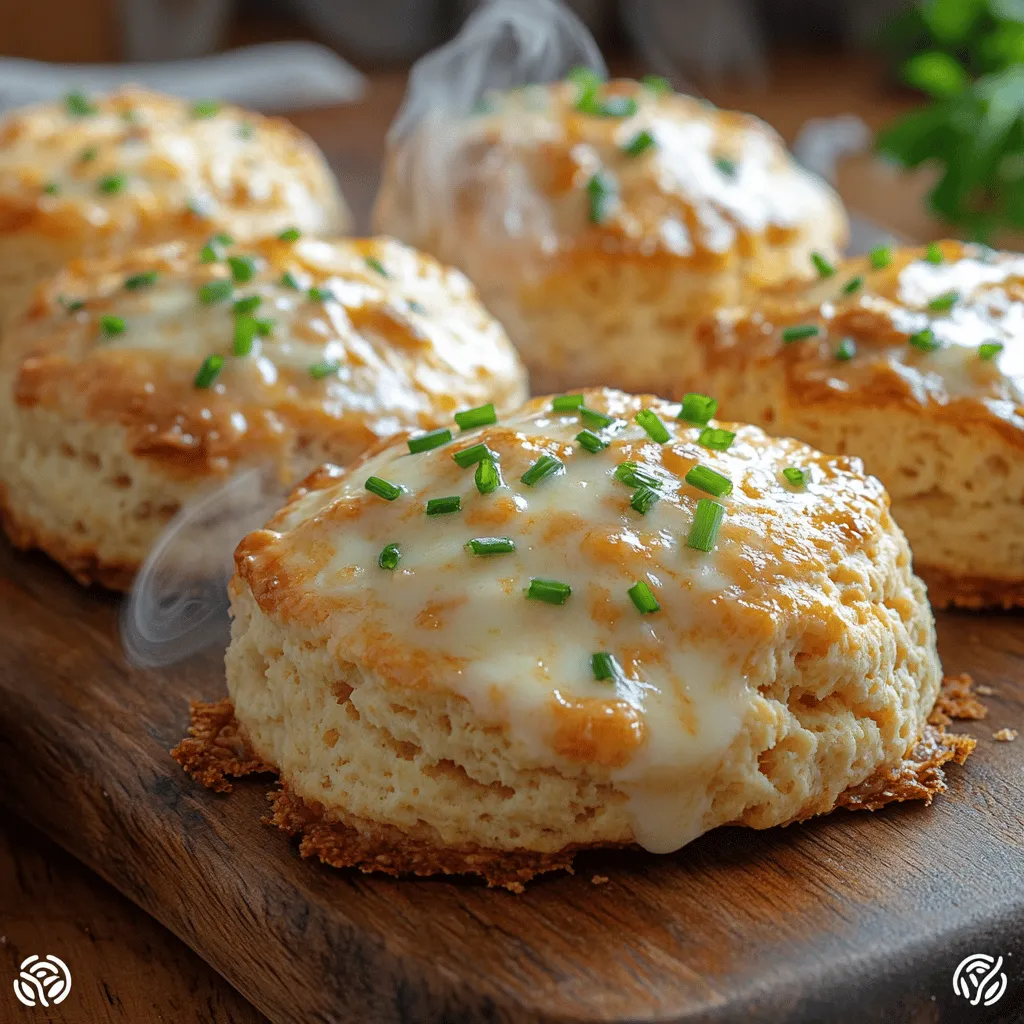Introduction
Scones have long been celebrated for their comforting texture and delightful flavors. While sweet scones often take center stage with their sugary fillings and fruity toppings, savory scones deserve equal recognition for their versatility and ability to satisfy a range of palates. Among the myriad of savory options, Cheddar Chive Scones stand out as a perfect blend of rich, sharp cheese and fresh herbs. Their buttery, flaky texture, combined with the savory punch of cheddar and the delicate aroma of chives, makes them a crowd-pleaser at any gathering.
Whether you’re looking for a quick breakfast option, a delightful addition to a brunch spread, or a satisfying snack to accompany your afternoon tea, these scones fit the bill perfectly. Their adaptability allows them to be enjoyed in various settings—served warm with butter, paired with soups, or even enjoyed on their own. Regardless of the occasion, these Cheddar Chive Scones are sure to impress.
Understanding Scones
To appreciate the beauty of Cheddar Chive Scones, it’s essential to delve into the world of scones themselves. Originating from the British Isles, scones have a rich history dating back to the 16th century. Traditionally, they were made with simple ingredients that were readily available, such as flour, sugar, milk, and butter. Over time, they evolved into a beloved component of the British tea culture, often served alongside clotted cream and jam.
Scones can be broadly classified into two categories: sweet and savory. Sweet scones are typically enriched with sugar, fruits, and spices, making them ideal for dessert or breakfast. In contrast, savory scones embrace a variety of flavor profiles, incorporating ingredients like cheese, herbs, and spices to create a delightful contrast. The key to a successful savory scone lies in achieving the perfect balance of texture and flavor, ensuring that each bite is both satisfying and delicious.
When it comes to savory scones, texture is paramount. A well-made scone should be light and flaky, with a crumb that is moist yet holds together. This is achieved by employing cold ingredients and minimal mixing to create layers that puff up during baking. The flavor balance is equally important; the sharpness of the cheese should complement, rather than overpower, the other ingredients, while the herbs add a fresh, vibrant note.
Ingredients Breakdown
The success of your Cheddar Chive Scones hinges on the quality and balance of the ingredients used. Here’s a closer look at the main components and their roles in this savory delight:
All-Purpose Flour
All-purpose flour serves as the foundation of the scone, providing the necessary structure while allowing for a tender crumb. It is essential to measure your flour accurately and avoid overmixing to ensure the right texture. A light touch while combining the ingredients will yield a flakier result.
Baking Powder
Baking powder acts as the leavening agent in this recipe, giving the scones their rise and lightness. It’s crucial to use fresh baking powder for optimal results, as expired leavening agents can lead to dense, unappetizing scones.
Salt and Black Pepper
Salt enhances the overall flavor profile of the scones, bringing out the richness of the cheese and the freshness of the chives. Black pepper adds a subtle warmth and depth, balancing the flavors perfectly. Adjust the seasoning according to your taste preferences, but don’t be shy—these elements are key to a well-rounded scone.
Unsalted Butter
Cold unsalted butter is a vital ingredient for achieving a flaky texture. The butter should be cut into small cubes and incorporated into the flour until it resembles coarse crumbs. This process creates pockets of fat that melt during baking, resulting in a tender scone. Using unsalted butter allows for greater control over the overall saltiness of the recipe.
Sharp Cheddar Cheese
The choice of cheese significantly influences the flavor of your scones. Sharp cheddar cheese is ideal for its robust flavor, which stands up well against the other ingredients. Grating the cheese ensures even distribution throughout the dough, providing bursts of cheesy goodness in every bite.
Fresh Chives
Fresh chives bring a mild onion flavor and a pop of color to the scones. They should be finely chopped to ensure they blend seamlessly with the other ingredients. If fresh chives are not available, you can substitute them with other herbs, such as green onions or parsley, although the taste will vary.
Egg and Buttermilk
Both the egg and buttermilk play crucial roles in adding moisture and richness to the scone dough. The egg helps bind the ingredients together, while buttermilk provides a slight tang and enhances tenderness. If buttermilk is unavailable, you can create a substitute by mixing regular milk with a splash of vinegar or lemon juice.
Milk for Brushing
A simple milk wash brushed on top of the scones before baking serves two purposes: it helps achieve a golden-brown finish and adds a slight sheen to the final product. For an even richer color, consider using an egg wash instead.
Step-by-Step Instructions
Now that we’ve covered the essential ingredients, it’s time to dive into the step-by-step instructions for making your own Savory Cheddar Chive Scones. Follow these detailed steps to create scones that are sure to impress.
Step 1: Preheat the Oven
Begin by preheating your oven to 400°F (200°C). This ensures that your scones will bake evenly and achieve that desirable golden-brown color.
Step 2: Prepare the Baking Sheet
Line a baking sheet with parchment paper. This will prevent the scones from sticking and make for easier cleanup.
Step 3: Combine Dry Ingredients
In a large mixing bowl, whisk together 2 cups of all-purpose flour, 1 tablespoon of baking powder, and ½ teaspoon of salt. This mixture serves as the base for your scones, ensuring even distribution of the leavening agent and seasoning.
Step 4: Cut in the Butter
Add ½ cup of cold, cubed unsalted butter to the flour mixture. Using a pastry cutter or your fingertips, work the butter into the flour until the mixture resembles coarse crumbs. Be careful not to overwork the dough; you want to retain small pieces of butter to ensure flakiness.
Step 5: Incorporate Cheese and Chives
Gently fold in 1 cup of grated sharp cheddar cheese and ¼ cup of finely chopped fresh chives. This step adds both flavor and texture to your scone dough. Stir until just combined, being mindful not to overmix.
Step 6: Mix Wet Ingredients
In a separate bowl, whisk together 1 large egg and ½ cup of buttermilk until well combined. This mixture will add moisture and richness to the dough.
Step 7: Combine Wet and Dry Ingredients
Make a well in the center of the dry ingredients and pour in the wet mixture. Using a fork or spatula, gently combine the ingredients until just moistened. The dough should be slightly sticky but manageable.
Step 8: Shape the Dough
Turn the dough out onto a lightly floured surface. Gently knead it a few times to bring it together, being careful not to overwork it. Pat the dough into a circle about 1-inch thick. Use a sharp knife or a pizza cutter to cut the circle into wedges, similar to slicing a pizza.
Step 9: Prepare for Baking
Transfer the scones to the prepared baking sheet, leaving space between each piece to allow for expansion. Brush the tops with a little milk for a beautiful golden finish.
Step 10: Bake
Place the baking sheet in the preheated oven and bake for 15-20 minutes, or until the scones are golden brown and a toothpick inserted into the center comes out clean. Keep an eye on them towards the end of the baking time to avoid over-browning.
By following these careful steps, you’ll create delicious Savory Cheddar Chive Scones that are not only visually appealing but also packed with flavor. The next part of our recipe will delve into additional tips for achieving the best results, storing your scones, and answering common questions about this delightful treat.

Preheating the Oven
Preheating your oven is a crucial step in baking that ensures your Savory Cheddar Chive Scones rise properly and develop a beautiful golden crust. An oven that is not adequately preheated can lead to scones that are dense and poorly risen. Set your oven to 400°F (200°C) and allow it to heat up for at least 15-20 minutes before placing your scones inside. This allows the baking powder to activate correctly and creates the ideal environment for those lovely, flaky layers to form.
Combining Dry Ingredients
The foundation of any great baked good starts with the proper combination of dry ingredients. For your scones, you’ll want to whisk together the flour, baking powder, salt, and any spices you may choose to include. This step is essential for ensuring an even distribution of the leavening agent throughout the flour, which ultimately affects the scone’s texture. Use a whisk to aerate the flour mixture, breaking up any lumps and ensuring that everything is well-blended. This will create a uniform base for your scones, allowing them to rise evenly during baking.
Cutting in Butter
Cutting in butter is a technique that can significantly influence the texture of your scones. The goal is to incorporate the butter into the flour mixture until it resembles coarse crumbs. There are a few methods to achieve this:
1. Using a Pastry Cutter: This tool is designed for cutting butter into flour. Simply press the cutter into the mixture, blending until the desired consistency is reached.
2. Using Your Fingers: If you don’t have a pastry cutter, you can use your fingertips to rub the butter into the flour gently. Be careful not to overwork the mixture, as you want to keep some of the butter pieces intact, which will create flaky layers during baking.
3. Food Processor: For a quick and efficient method, pulse the butter and flour together in a food processor until the mixture resembles coarse crumbs. Remember to stop before it turns to a paste.
Incorporating Cheese and Chives
Once your butter is properly cut into the flour mixture, it’s time to add the star ingredients: shredded cheddar cheese and chopped chives. To ensure that the cheese and herbs are evenly distributed throughout the dough, sprinkle them over the flour mixture and gently fold them in using a spatula. This method helps maintain the integrity of the cheese, preventing it from clumping together and ensuring that every scone is packed with flavor.
Mixing Wet Ingredients
In a separate bowl, whisk together the wet ingredients—typically milk and an egg for this scone recipe. It’s crucial not to overmix the dough at this stage. Gently combine the wet and dry ingredients using a spatula or wooden spoon until just incorporated. Overmixing can lead to tough scones, so mix until the dough is barely combined with some dry flour still visible. This is the key to achieving the light and tender texture characteristic of perfect scones.
Shaping the Dough
Once your dough is mixed, it’s time to shape it. Turn the dough out onto a lightly floured surface and gather it into a ball. Gently knead the dough a few times—this step is essential for bringing everything together without developing too much gluten. After kneading, flatten the dough into a circle about 1-inch thick. The thickness is important for the scones to rise correctly.
Cutting the Scones
To cut your scones, you can use a sharp knife or a round biscuit cutter. If you prefer traditional triangular scones, simply cut the circle into wedges. For round scones, press down firmly with a biscuit cutter, making sure not to twist, as this can inhibit rising. Transfer the cut scones onto a parchment-lined baking sheet, leaving space between them to allow for expansion during baking.
Brushing and Baking
For an appealing golden color on your scones, brush the tops with milk or an egg wash made from beaten egg and a splash of milk. This simple step enhances the scone’s appearance and adds a lovely sheen. Bake in your preheated oven for 15-20 minutes or until the tops are golden brown. Keep an eye on your scones, as oven temperatures can vary. The scones are done when they feel firm to the touch and have a pleasant aroma wafting through your kitchen.
Cooling and Serving
Once baked, remove the scones from the oven and let them cool on a wire rack for a few minutes before serving. This resting time allows the steam to escape, which helps maintain their light texture. Savory Cheddar Chive Scones are best enjoyed warm, but they can also be stored in an airtight container for a couple of days.
Serving Suggestions
To elevate your scone experience, consider the following serving suggestions:
– Spread Options: These scones pair beautifully with a variety of spreads. Try serving them with a pat of butter, cream cheese, or an herbed-infused spread to complement the savory flavors.
– Beverage Pairings: For a delightful afternoon or brunch experience, enjoy your scones with a cup of freshly brewed tea or coffee. They also pair well with light salads if you’re serving them as part of a meal.
– Occasions for Serving: Savory Cheddar Chive Scones are versatile and suitable for various occasions. Whether it’s a cozy brunch with friends, a picnic in the park, or a casual tea gathering, these scones will impress your guests and add a touch of warmth to any occasion.
Nutritional Information
When it comes to enjoying your homemade Savory Cheddar Chive Scones, understanding their nutritional content can help you make informed choices. Each scone (based on an average size) typically contains approximately:
– Calories: 200-250 kcal
– Protein: 6-8 g
– Fat: 10-15 g
– Carbohydrates: 25-30 g
The combination of cheese and chives not only contributes flavor but also offers several health benefits. Cheddar cheese is a good source of calcium and protein, while chives provide vitamins A and C, as well as antioxidants. If you’re looking to cater to dietary preferences, consider these modifications:
– Gluten-Free Option: Substitute all-purpose flour with a gluten-free flour blend.
– Dairy-Free Alternative: Use plant-based cheese and non-dairy milk.
– Lower Fat Version: Swap out some of the butter for Greek yogurt to reduce fat while keeping moisture.
Conclusion
Savory Cheddar Chive Scones are a delightful blend of flavors and textures that can elevate any meal or occasion. With their flaky, tender crumb and rich cheese flavor, these scones are perfect for brunch, tea time, or even a cozy night in. The process of baking them at home not only fills your kitchen with an irresistible aroma but also offers the satisfaction of creating something truly special.
So why not give this recipe a try? Gather your ingredients, follow the steps, and indulge in the joy of baking. Once you taste the warm, cheesy goodness of your homemade scones, you’ll understand why they’re a beloved treat. Share your experience with friends and family, and enjoy the warm conversations that good food inspires. Happy baking!

